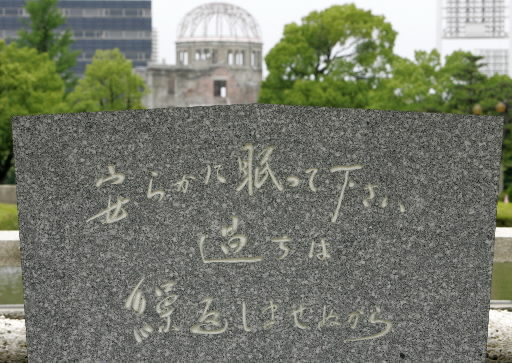Nuclear Weapons Can Be Eliminated: Chapter 12, Part 7
Jun. 25, 2010
Chapter 12: Opening the Door to Abolition
Part 7: Fulfilling humanity's obligation
by the "Nuclear Weapons Can Be Eliminated" Reporting Team
"Let all the souls here rest in peace; for we shall not repeat the evil."
This pledge is engraved in 21 Japanese characters on the Cenotaph for the A-bomb Victims in Hiroshima Peace Memorial Park. The inscription is found on the stone chest, sheltered by the cenotaph, which holds the register for the bomb's victims, containing 263,945 names to date.
Nearly 65 years have passed since the atomic bombing. However, the memory of the tragedy, along with the sorrow of the people whose loved ones vanished from their lives, has been scored in the hearts of those who live today and deeply permeates the ground of the city. This memory serves as the basis of our commitment: such an evil must not be repeated. Unless nuclear weapons are eliminated, it will mean that human beings have learned nothing from this sacrifice.
A-bomb survivors (hibakusha) are aging. The average age for hibakusha has risen to over 75. As of the end of March 2009, a total of 235,569 people nationwide hold the Atomic Bomb Survivor's Certificate. Compared to 1980, when the greatest number of people held the certificate, the figure has declined by approximately 140,000.
In this setting, though, the two factions of the Hiroshima Prefectural Confederation of A-bomb Sufferers Organizations were involved in as many as 1,456 consultations about the application for the survivor's certificate, A-bomb disease certification, and other matters.
"The consequences of the atomic bombing of Hiroshima are not over," stressed Tomiaki Nagahara, 63, a second-generation A-bomb survivor living in the city of Kure. His father did not disclose that he was an A-bomb survivor until just prior to his death in 2000 at the age of 82. Mr. Nagahara ponders the trauma of his father's experience, which never healed over the course of half a century.
"I hated the United States for dropping the atomic bombs," said Hitoshi Takayama, 79, an A-bomb survivor and a resident of Higashi Hiroshima City. "But I felt even more strongly that I had to do whatever I could so the suffering we endured would never have to be experienced by anyone else." This is the reason Mr. Takayama became engaged in translating A-bomb accounts into English.
Whenever such sentiments of the A-bomb survivors are touched upon, it becomes acutely clear that the elimination of nuclear weapons is humanity's obligation.
U.S. President Barack Obama, the leader of the nation which dropped the atomic bombs, said in a speech from Prague in April 2009 that "As the only nuclear power to have used a nuclear weapon, the United States has a moral responsibility to act" and he pledged efforts toward the elimination of nuclear weapons. At the same time, though, Mr. Obama stated that "The goal will not be reached quickly--perhaps not in my lifetime," and "As long as these weapons exist, the United States will maintain a safe, secure and effective arsenal to deter any adversary, and guarantee that defense to our allies."
A number of people contend that realizing the swift elimination of nuclear weapons is unrealistic. Such a conclusion might easily be drawn given the state of international politics. Meanwhile, it is naturally true that the advances of science, in terms of technology and knowledge, cannot be dialed back.
However, is it politics that brings the tools of war into being? Is it science which leads humanity into its misfortunes? Who on earth, among our global citizens, would wish for our current dilemma, where a glut of nuclear arms exist that could annihilate human life many times over?
To our regret, our reporting has brought us face to face with the fact that the A-bombed nation of Japan, expected to exert leadership toward the elimination of nuclear weapons, has earned only a nominal reputation in this regard.
Still, we have also sensed that public awareness, which rejects nuclear weapons, is growing, both in the nuclear weapon states and in the non-nuclear weapon states. Against this backdrop, talk of a nuclear weapons convention, which would outlaw these inhuman weapons, has increased significantly in the world of international politics.
From Hiroshima, we appeal once again: Nuclear weapons can be eliminated; nuclear weapons must be eliminated.
This concludes the special series "Nuclear Weapons Can Be Eliminated." This series was written by Keisuke Yoshihara, Yumi Kanazaki, Junichiro Hayashi, Sakiko Masuda, Kohei Okata, Noritaka Egusa, and Akira Tashiro.
(Originally published on June 21, 2010)








